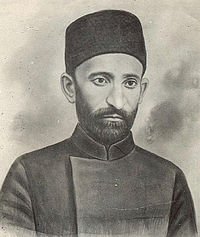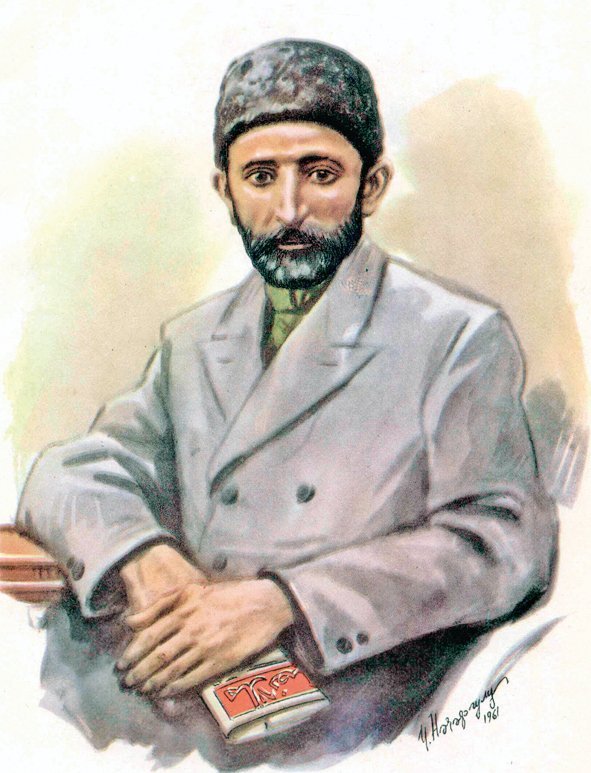Alakbar Zeynalabdin oghlu In the Tahirzade Sabir Shamakhi, he opened his first eyes to the world (1862). His father a pious man with a small grocery store and wanted to see Alekperi in the future spiritually. So when his son was eight years old, he was put in a mullah.
The first task of the students in the Molla was to read the Koran. However, Alakbar was beaten and beaten by his mullah because he had written the Qur'an before he finished reading it. It was the only unmotivated law and regulations in the mullahs, which had been overthrown. At home, the father and his mother were forced to fast on their eight-year-old sons and pray. In the first verse of Sabir's three childhood verses, this bitter truth is expressed very impressively:

When I fasted,
There were two eyes in the pot,
Mollam also writes the beat.
Sabir studied at a madhouse until the age of 12, and then passed to the new school of poet Seyid Azim. This school has benefited from it, especially in the development of knowledge and poetry talent. His teacher, Alikabara, translated poems from Persian into Persian, then read and consulted these translations and encouraged the poet's creativity.
Seyyed Azim, along with translations of his pupil, also read and edited his original poems. But a year or two later, his father, Alekper, was separated from his education and assisted in his shop. However, the young man, who does not quit the science and literature, is still reading and writing. According to the well-known Abbas Sahheth, Sabir was anxious to read or write rather than shopping - often his father was angry and even scolded his book.
Though his father's action has a serious effect on young Sabir, he can not avoid reading his poems and poems. On the contrary, he writes on a continent that he would not abandon poetry in response to the tearing of his father's book, and that if his father hurt him, he would leave Shamakhi.
Indeed, Sabir travels to Central Asia and then to Iran, traveling through the 1885 visit to escape the suffering of his father. He travels to Sabzivar, Nishapur, Samarkand, Bukhara, Khorasan and other cities. On the one hand, the poverty and ignorance of the local feudal and spiritual masters have a great impact on the poet, and on the other hand they meet with progressive scholars and writers in these cities.
After returning from his first trip, in 1887, he married a girl named Bullurnus. For fifteen years, she has had 8 daughters and one son. Having such a large family made Sabir's situation extremely difficult. The poet, who had no other art, sells soap and sells his family very diligently. Nevertheless, he was still in contact with the leading intellectuals of the period, engaged in artistic creativity.
The terrible earthquake in 1902 resulted in the city being destroyed. As a result of the fire, hundreds of buildings were burned in the city, and most of the population remained homeless and dry. At that time, Sabir's house had collapsed. The poet alone solely made a temporary hut for his family.
Reminds that Sabir, a very devoted, caring, affable family head, sought to provide not only material needs but also moral comfort and progress. He wants to see his wife and daughter educated and teach them alphabet. The poet's daughter, Sutyagin, later wrote that, despite the fact that her life was extremely painful, my father was pleasant, jealous, and sincere.
In the late 19th and early 20th centuries, Sabir, a caring parent, was somewhat far from the lane but was not completely separated. Abbas Sahhat, who returned to Shamakhi in 1901, had a great deal of moral support. In their spare time, a small literary council with Aali Bey Nasah and Mohammad Tharrah, one of the intellectuals of Shamakhi, in the evening, read and analyzed classical poets or their poems.
From the beginning of the twentieth century Sabir's poems appeared in their press pages. In 1903, in the "East-Rus" newspaper, his shereline was published. Shortly afterwards, he wrote poems in the "Hayat" newspaper. In 1906, he became one of his most beloved poets, one of the most active writers of the magazine "Molla Nasreddin", as a genuine folk magazine according to his wishes.
Since that time, there has been an indefatigable relationship between J.Mammadguluzade and Sabir. Both artisan laborers were crushing blows to cruel masters, clergymen, and intelligent intellectuals asking for the blood of the people. As a result Sabir gained many friends, and the enemy also won. Despite writing their poems secretly, Shamakhi and Baku, as well as in other parts of Azerbaijan and Iran, many rebels condemn the works of the poet and announce those who read his writings as disbelievers. Even the clergy sometimes give a fitva to the death of Sabir, the wealthy send him threatening letters, and the riders cut off their way down the street and utter heavy words.

Posted from my blog with SteemPress : https://yasasteemit.000webhostapp.com/2018/10/mirza-alakbar-sabir